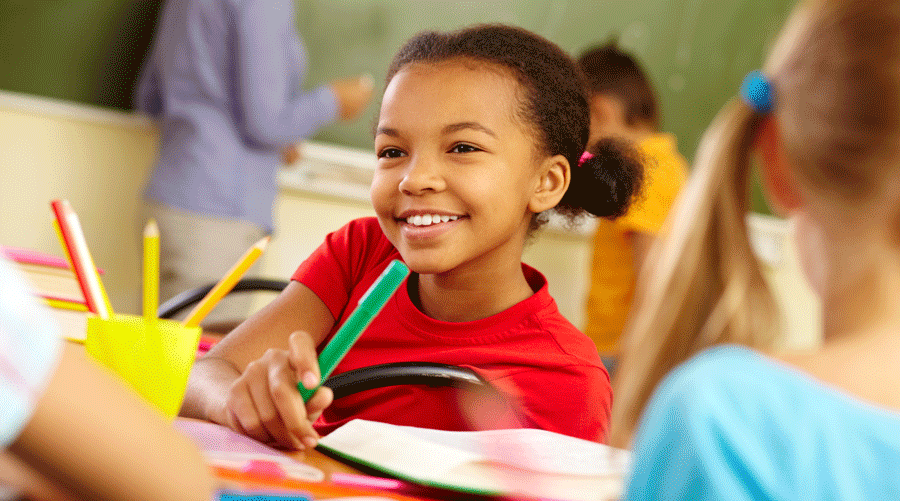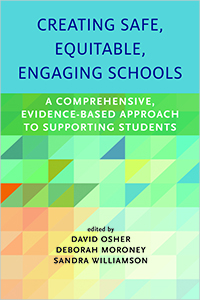Spotlight on School Climate

Schools and communities contend with many factors that affect the conditions for learning, such as bullying, harassment, violence, and substance abuse. Accurately measuring school climate helps schools identify areas of improvement and choose evidence-based interventions for effecting positive change.
Read what our researchers are finding out about how learning environments affect whether students feel—and are—safe, connected, supported, and challenged.
Creating a Positive School Environment
National Center on Safe Supportive Learning Environments (NCSSLE)
NCSSLE aims to improve conditions for learning in schools so that all students have the opportunity to realize academic success. The Center includes resources for measuring school climate; guides and training products to support building and promoting safe and supportive learning environments for all students; and technical assistance and training services for stakeholders such as state administrators, personnel in institutions of higher education, and district and school administrators to improve conditions for learning.
COVID-19 and Whole Child Efforts: Reopening Update
Several national organizations have offered frameworks and resources for planning for the reopening school buildings closed due to COVID-19. Policymakers and practitioners will need a shared understanding of the common whole child terms and phrases as they plan and work to mobilize student supports. This resource provides definitions for key terms along with an analysis of the inclusion of these terms in the various reopening guidance documents.
 Creating Safe, Equitable, Engaging Schools: A Comprehensive, Evidence-Based Approach to Supporting Students
Creating Safe, Equitable, Engaging Schools: A Comprehensive, Evidence-Based Approach to Supporting Students
Educators want actionable strategies and practices to ensure that all students can access equitable learning environments. Creating Safe, Equitable, Engaging Schools integrates the collective wisdom of over 30 AIR experts, as well as research and field leaders, to help school leaders make sense of the various evidence-based resources and frameworks designed to support the whole child.
Creating Healthy Schools: Ten Key Ideas for the SEL and School Climate Community
Supporting young people socially and emotionally—not just academically—is key to lifelong success. In this report, Elizabeth Devaney and Juliette Berg shares the ten critical ideas for moving forward with social and emotional learning and school climate work in states and districts across the country.
The Good Behavior Game: Success in the Classroom and Beyond
The Good Behavior Game is a team-based classroom behavior management strategy designed for early grades, helping children master the role of student and be successful at the demands of the classroom. The AIR approach to implementing the Good Behavior Game is grounded in research on adult learning and professional development.
Beyond Shame and Blame in the Classroom
In this blog post, Angela Minnici and David Osher contend that the video and some reactions to it reveal a faulty understanding of the kind of educational experiences students—especially the most vulnerable—need to succeed in school, career, and civic life and of the role the adults play in creating those experiences.
Chronic Absence: Busting Myths and Helping Educators Develop More Effective Responses
The simple act of not attending school consistently increases the likelihood that children will be unable to read well by grade 3, fail classes in middle school, and drop out of high school. Standing in the way of truly addressing chronic absence are three harmful myths.
Measuring School Climate
Making SEL Assessment Work: Ten Practitioner Beliefs
In the SEL field, multiple assessment issues—from the complexity, validity, and reliability of measures, to the use and interpretation of results—baffle even the most experienced researchers. AIR and CASEL convened 28 practice leaders from across the country to understand how they are implementing, assessing, and refining their SEL practices.
Are You Ready to Assess Social and Emotional Development?
The Ready to Assess suite of tools helps education leaders, practitioners, and policymakers decide whether and how to assess social and emotional development.
Measuring School Climate for Gauging Principal Performance
This policy brief provides principal evaluation system designers information about the technical soundness and cost (i.e., time requirements) of publicly available school climate surveys.
Preventing Violence and Harassment
Bullying Prevention
As more is being learned about the negative psychological and physical effects of bullying, researchers are focusing on how to address the problem. The research and resources featured here relate to efforts to prevent violence in schools and help young people feel safe and supported.
Research on Lowering Violence in Communities and Schools (ReSOLV)
A comprehensive approach to school safety requires a focus on the root causes within the school and larger community setting. In support of the National Institute of Justice's Comprehensive School Safety Initiative, AIR—in partnership with Virginia Tech, The Wandersman Group, and a group of nationally recognized school safety experts—is conducting Research on Lowering Violence in Communities and Schools (ReSOLV). Patricia Campie answers questions about the project
Safe Place to Learn Resource Kit
The Safe Place to Learn resource package provides a range of materials to support school efforts to prevent and eliminate peer-to-peer sexual harassment and sexual violence. This resource package supports school district and school staff efforts to comply with Title IX sex discrimination prohibitions and create a positive school climate.
Safe Place Resource Kit: Trauma Sensitive Practice for Health Centers Serving Higher Education Students
Roughly one in five women nationally is sexually assaulted while in college. This diverse collection of tools uses trauma-informed care as a foundation for helping university health centers deal with this crisis.


